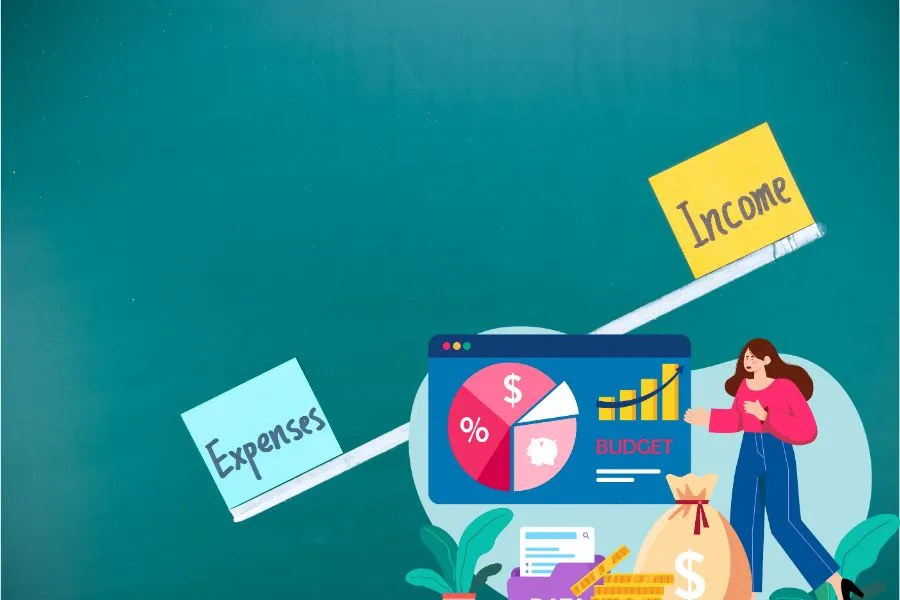Correlation Analysis between Income and Expenses
In personal finance management, it is crucial to understand the relationship between income and expenditure for achieving financial success. Correlation analysis is an effective method for examining the relationship between these two essential aspects of financial stability. By analysing the connection between income and expenses, individuals can identify specific tendencies and predict their savings potential and overall financial stability.

What is Correlation Analysis?
Pearson moment correlation analysis is a statistical method used to determine the degree of relationship between two variables. In the context of personal finance, the focus is on income and expenses as the key variables. Correlation coefficients range from -1 to +1, where:
- +1 indicates a perfect positive correlation (both variables move in the same direction).
- -1 indicates a perfect negative correlation (variables move in opposite directions).
- 0 indicates no correlation (variables are independent of each other).
Why Correlate Income and Expenses?
Understanding the correlation between income and expenses is vital for several reasons:
Budgeting:
Understanding how income correlates with expenses aids in creating realistic budgets. It helps individuals allocate funds effectively, ensuring that expenses do not exceed income.
Financial Planning:
Correlation analysis provides insights for long-term financial planning. By identifying patterns in income and expense behaviour, individuals can anticipate future financial needs and set appropriate savings goals.
Risk Management:
Recognizing the correlation between income and expenses allows for better risk management. Individuals can prepare for potential fluctuations in income by adjusting their spending patterns accordingly.
Benefits of Correlation Analysis:
Identifying Spending Patterns:
Correlation analysis highlights spending patterns that may be contributing to financial strain or success. It allows individuals to pinpoint areas where expenses can be reduced or optimised.
Monitoring Financial Health:
Regular correlation analysis enables individuals to track changes in their financial health over time. By observing fluctuations in the correlation coefficient, individuals can take proactive measures to maintain financial stability.
Informing Investment Decisions:
Understanding the correlation between income and expenses can influence investment decisions. It helps individuals assess their capacity to invest surplus income and navigate risk tolerance based on expense obligations.
Practical Applications:
Expense Prioritisation:
Correlation analysis helps individuals prioritise expenses based on their impact on overall financial well-being. Essential expenses such as housing, utilities, and debt payments may have a higher correlation with income compared to discretionary expenses.
Adjusting Lifestyle Choices:
Insights from correlation analysis can prompt individuals to reevaluate their lifestyle choices and spending habits. It encourages mindful consumption and encourages saving for future financial goals.
Adapting to Life Changes:
Major life events such as job loss, salary increases, or starting a family can impact the correlation between income and expenses. Correlation analysis allows individuals to adapt their financial strategies accordingly to navigate these transitions effectively.
In summary, correlation analysis between income and expenses is an invaluable tool for personal finance management. By understanding the relationship between these two variables, individuals can make informed decisions, optimise their financial resources, and work towards achieving their long-term financial goals. Regular monitoring and analysis empower individuals to take control of their finances and build a solid foundation for financial security and prosperity.
Active Events
Data Scientist Challenges One Should Avoid
Date: Feburary 25, 2025 | 7:00 PM (IST)
7:00 PM (IST) - 8:10 PM (IST)
2753 people have registered
Transforming Development: The AI Edge in Full Stack Innovation
Date: Feburary 27, 2025 | 7:00 PM(IST)
7:00 PM(IST) - 8:10 PM(IST)
2811 people have registered
Bootcamps
Data Science Bootcamp
- Duration:4 Months
- Start Date:Feb 9, 2025
Data Analyst Bootcamp
- Duration:4 Months
- Start Date:Feb 9, 2025
